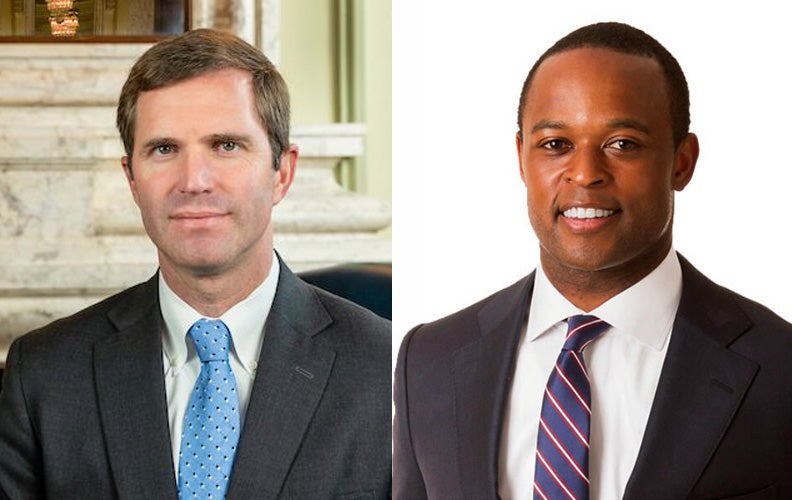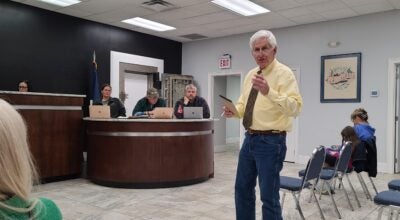Ky governor and AG agree: Public meetings can be live-streamed during COVID-19 crisis
Published 3:20 pm Thursday, March 19, 2020

- Gov. Andy Beshear, left, and Attorney General Daniel Cameron issued an executive order and opinion, respectively, Wednesday, that draw the boundary lines for conducting public meetings via video teleconference during the COVID-19 pandemic threat.
Kentucky’s governor and attorney general have redefined how governments can hold public meetings during the ongoing COVID-19 state of emergency.
On Wednesday, Gov. Andy Beshear issued an executive order suspending parts of the Open Meetings Act concerning requirements for public agencies to meet in a physical location and provide access to the public. Beshear cited guidelines from the CDC and Kentucky Department of Public Health that recommend avoiding gatherings of people in order to slow the spread of the COVID-19 coronavirus that has killed thousands of people globally.
The same day, Attorney General Daniel Cameron issued an opinion explaining how public agencies could go about meeting in a transparent manner during the pandemic crisis.
“We are experiencing something wholly new and untested in our lifetimes or the lifetime of the law,” said Amye Bensenhaver, a retired assistant attorney general and co-founder of the Kentucky Open Government Coalition. “My consolation is in knowing that all the viable alternatives to in-person meetings are mandated by the governor and AG. There’s a clear commitment to ensuring alternative mechanisms for protecting both the public health and the public’s right to know.
“It’s not pretty, and the greatest challenges lie ahead for smaller agencies with fewer resources. That’s where the public will need to be vigilant.”
Beshear and Cameron both gave public agencies the green light to conduct public business via video-teleconference meetings, without providing a physical location where members of the public could watch the proceedings. But they both said public agencies must instead provide live streaming of audio and video from those meetings for the public.
“The potential crisis facing the commonwealth is of unparalleled magnitude,” Cameron’s opinion states. “Yet, public agencies must continue providing critical public services. And in doing so, agencies subject to the Open Meetings Act must conduct public business in open meetings to deliver those services.”
Cameron’s opinion requires public agencies to notify the public that they intend to hold a meeting via video-teleconference. And the agencies must “‘precisely identify’ the website, television station or other technological means by which members of the public may access” the meeting. Media representatives will still be allowed to attend meetings in-person when possible.
“The fact that a worldwide pandemic caused by a highly contagious infectious disease makes a physical meeting location for the public infeasible does not mean that an otherwise open meeting can be conducted in executive or closed session,” Cameron’s opinion states.
Boyle County’s plans
Boyle County Judge-Executive Howard Hunt said the county will use the same technology it used Tuesday to live-stream a joint press conference concerning COVID-19 response to live-stream a fiscal court meeting planned for Tuesday, March 24.
Hunt said a link to the live-stream will be made available on the agenda for the meeting, which will be posted on the boyleky.com website. The live-stream can also be accessed via this link.
“We will be completely compliant as best we can” with the new rules laid out by Beshear and Cameron, Hunt said.
For Tuesday’s fiscal court meeting, the only attendees allowed will be court members, people who are presenting to the court and a representative of any media outlet covering the meeting, he said. Anyone else wanting to attend will need to watch the live stream instead.
As for public participation and involvement in the meetings, “I think that’s going to have to wait right now,” Hunt said. “Things are so fluid and changing so rapidly.”
The live-streamed recordings of fiscal court meetings will also be archived on the county’s website, enabling people to re-view the meetings at any time. It could even wind up being a new feature people like, if they’re able to go back and watch a meeting and see what their elected officials did and said, Hunt said.
“Transparency is always important, and it’s especially important where you have restricted in-person opportunities for the public,” he said. “… So when that has to be restricted from a health perspective, then we need to be able to reach out and provide folks in Boyle County the opportunity to see live what’s going on, to hear live what’s going on.”
Danville’s plans
Danville City Manager David Milliron said Danville should be ready soon to conduct public meetings using an online platform that would allow up to 250 participants at the same time.
“It will allow the mayor and commissioners to be remote, utilizing their smartphones or webcams to be able to connect, and then allow the public to view it or even (participate),” Milliron said.
The public will also have the ability to make comments and submit questions in real time, he added.
Milliron said the technology is available at little to no cost, so it’s more a matter of local governments becoming aware of its availability than having to invest a lot of money. But Danville being big enough to have IT staff employed definitely benefited the city in getting up and running quickly.
Staff will practice with a “dry run” on Monday, simulating how a real commission meeting would work, Milliron said.
“My wife will be one of the folks that is going to be a guinea pig. She will be a mock council member, if you will, connecting remotely,” he said. “We will be here at (city hall) making sure it works and working out the kinks.”
After Monday’s practice session, staff will train commissioners how to use the technology, and then the city will be ready to start holding meetings, he said.
Milliron said he is working with City Attorney Stephen Dexter to draft a resolution that outlines how the city commission will meet going forward. The resolution could potentially cancel all regular meetings and plan for every future meeting during the state of emergency to be a special called meeting. It could also require all meetings to be held by video-teleconference and prohibit commissioners from attending in person. And the agenda could be required to specify the exact URL the public can use to access the meeting, in keeping with the rules laid out by Cameron and Beshear.
Transparency is important to how government functions — and it’s especially important during crises, Milliron said.
“The reality is sunshine is always the best antiseptic to make sure the public is aware of what their local government is doing,” he said. “… We have provided even more communication than usual so the public knows what is happening and what their government is doing.”
Milliron said the city’s system will be made available to other public agencies such as Planning and Zoning if they request it. He said he’s more concerned about smaller cities and agencies, especially in rural areas without strong access to high-speed internet.
“When you get into some of these smaller, rural communities, they will not have the broadband and bandwidth, if you will, to have online public meetings,” he said.
Milliron said now is probably the ideal time for cities that haven’t embraced the use of social media or don’t have a website to begin adding those capabilities.
The Kentucky Open Government Coalition expressed a similar concern in a post about the new rules Wednesday night.
“Many smaller, local agencies will face a challenge in implementing this guidance,” the post reads. “We, too, hope that these agencies will receive technical assistance in live-streaming meetings conducted by remote participation.”
Other agencies’ plans
Perryville Mayor Brian Caldwell said his small town in western Boyle County canceled its March council meeting and he isn’t sure what will happen with the April meeting.
“We’re fortunate enough in Perryville to where we could push our meeting back a couple of weeks, actually,” he said. “So that gives us quite a bit of time to play with, unless this becomes more of a problem. … I think everybody is kind of at the mercy of just how bad this thing gets.”
But Caldwell said if Perryville City Council did need to hold a meeting, “it would not be an obstacle for us to live-stream our public meetings.”
“I’m confident if it came down to that, we could definitely handle doing a live stream of our meeting,” he said. “We hope it doesn’t come to that. We’re just going to have to see.”
Junction City Mayor Jim Douglas said Thursday that his city is “shut down” and not planning on any meetings right now. As for the new rules created by the governor and attorney general, “I know nothing about it,” Douglas said.
“Eventually, we will have to (meet). But we’re just corresponding individually right now,” he said.
Asked whether Junction City would be able to live-stream meetings in the future, Douglas said, “Of course we’ll have to consider something like that, sure.”
Representatives for the Boyle and Danville school districts confirmed Thursday they are working on plans to hold meetings according to Beshear’s and Cameron’s rules.
A 2 p.m. Friday meeting of the Boyle County Board of Education will be held using technology from the company Zoom, and members of the public can access the meeting on YouTube via this link or by visiting the district’s website, according to Jacquie Peterson, director of communications for the district.






